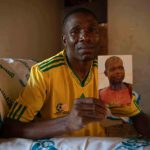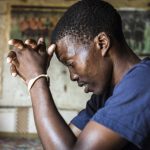People with albinism live in constant fear
In northern KwaZulu-Natal, those with the congenital condition that affects their pigmentation are always fearful – and the police do little to protect them.
Author:
10 September 2019

Njabulo Dlamini, 23, is in grade five. Until he was 16, he had no friends. He says his mother struggled to accept him and eventually abandoned him. Njabulo has albinism.
He started school just six years ago. Before then, he says, he used to sit at home and watch while his younger brothers and sisters went to school.
When you first meet him, his courteous manner is coupled with cautious behaviour. He seems constantly wary. But the presence of his adoptive mother, Mambubu Mathenjwa, 57, is warm and amicable. It rubs off, and finally Njabulo smiles and begins to share his story.

He now lives with his oldest brother’s family in Manguzi, Umhlabuyalingana, north of KwaZulu-Natal. His brother’s wife, Mathenjwa, is his foster mother. The district is widely known as the home of traditional medicine. The area incorporates the iSimangaliso Wetland Park, home to a Unesco World Heritage Site. But a deadly trade pervades the area: the killing of people living with albinism, and the selling of their body parts.
Those living with the congenital condition in which they lack colour pigmentation in their skin, hair and eyes still remain sidelined and in some areas, actively targeted. Several people with albinism have had to hide from potential kidnappers in the area, including Fanele Sibiya, 2, and Mthokozisi Mabika, 13.
To some who believe in the mythological medicinal “powers” of people with albinism, Njabulo and others like him are izinyamazane (wild animals hunted and killed for a spell to become wealthy). His family says the threat of death is always on their minds.
Related article:
“When it gets dark, and he is not home, I start to panic. I’m constantly worried,” says Mathenjwa. “He came to visit us during the June holidays in 2012. He stayed for the entire month, and his mother never called [once] to ask how he was,” she says.
Mathenjwa adds that although it has been a difficult task, she has managed to enrol Njabulo in a school and to get him an identity document, so he can apply for a disability grant.
“Although it has taken him time to adjust to a new environment, he is happier here because he is not treated any different. Here he is just a human being. He’s the best cook in the house. It’s his specialty. It has taken him some time to grasp lessons at school, but he has never stopped going, and he is fully supported here,” says Mathenjwa.
Njabulo says his condition has made him a curse. To people who believe in the mythological powers of people like him, he is worth more than R100 000.
Targeting children
A member of Mthokozisi’s family was arrested for attempting to kidnap Mthokozisi, in June 2016. She was released, shortly thereafter. Mthokozisi’s mother, Lizzy Mthembu, described the day it happened: “A family relative came to visit. Although we didn’t share a close relationship, we allowed her to stay. But this time, her visit was strange. Instead of staying, she insisted on knowing where Mthokozisi was. Two suspicious men were waiting at the gate. When I asked if they were with her, she said one of them was her boyfriend,” says Mthembu. “I said [Mthokozisi] was not home, and she later left.”
Puzzled, Mthembu questioned her relative’s strange behaviour but disregarded the suspicion. Later that night, two police officers visited the family of 13 and said Mthokozisi was in danger and that they needed to get away from Manguzi.
Related article:
“I was reluctant to open for the two policemen when they arrived because they weren’t wearing uniforms. I had already heard that people were hunting for albinos and so I immediately went to hide my son. When I opened the door, they told me they had arrested a woman who had my son’s name as first on the list of people she was selling to bogus sangomas so she could be rich,” says Mthembu.
The police informed Mthembu that the woman who had visited her earlier was a lead in an undercover investigation. She had approached a controversial local traditional medicine healer, Ugodo Olulala Amankankani, and told him she was selling four children living with albinism. The healer reported this to the police and the woman was subsequently caught when she identified the homes where the four children would be taken, with two policemen disguised as sons of the healer. She was arrested but soon released.
Mthokozisi’s family hid him at Ndlondlweni, a few kilometres from Manguzi, where he stayed for a month. The family says it now lives in constant fear and confinement since the woman involved is still around.

Living in fear
Feziwe Sibiya, whose daughter lives with albinism, tells of her life of fear. “A week after I had given birth to Fanele, I heard about the recent killing of a local young albino girl, who was sold and killed by her lover, and there were many rumours going around that more people with albinism were targets in the area. We felt unsafe and decided to leave. We stay at her father’s place for a month and then come back so that the people preying on her lose track of us,” she explains.
A teary Sibiya says she keeps her daughter under constant surveillance. The killings of those living with albinism has made her distrust people. She says the local woman who identified Mthokozisi as a child to be sold also marked out her daughter.
“The price on my daughter’s head was said to be R50 000. I cannot live in peace in this place knowing that some people think killing my child will bring them wealth. I don’t trust my neighbours. People I sit with in the taxi or people walking behind me when I am with my daughter. Any of them could be after my child’s head.”
Traditional healers respond
Mandla Gininda, from the Kwatsaduza Albinism Society Initiative, which operates under the Genetic Alliance of South Africa, says the discrimination and killings of people living with albinism needs to be properly acknowledged as a serious issue by the South African National Department of Health.
“A lot of the myths and false beliefs about people living with albinism are caused and perpetuated by people who do not have information on albinism or medicine,” he says. “False medicinal practitioners continue to mislead people who want quick cash by convincing them that killing a person with albinism will create wealth for them. This has led to many people living like fugitives.”

Khothiza Ngubane has been working with traditional medicine since 1979. He says the National Unitary Professional Association for African Traditional Health Practitioners of South Africa in Umhlabuyalingana is working to combat these killings and to promote accredited traditional medicine healing.
“True healing from a sangoma or inyanga involves only using herbs, plants and animals such as certain snakes and some wildlife. It never includes the use of human blood or flesh. Anyone using human blood or organs from a person is a false practitioner. As African traditional health practitioners, we heal people, not kill them,” explains Ngubane.
For Njabulo, Mthokozisi, Fanele and their families, a sense of safety in the communities in which they live, work and play is still an impossible dream.
In honour of Albinism Awareness month, the Market Theatre in Johannesburg is staging Mama, I want the black that you are, a play written and directed by Arthur Molepo, focusing on the prejudices that affect the lives of people living with albinism, from 18-22 September.


